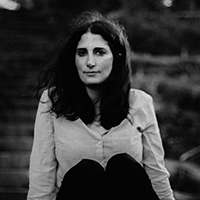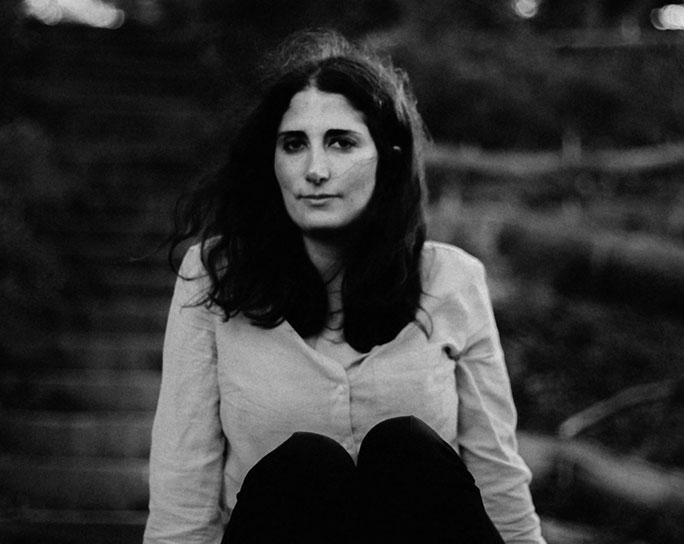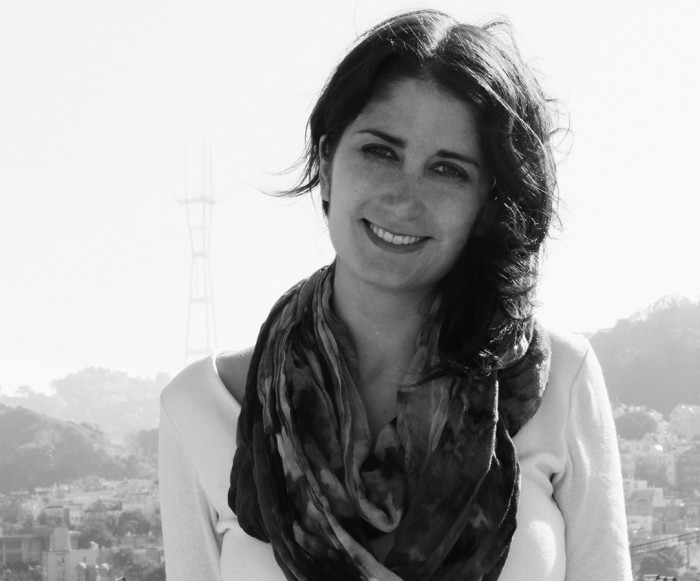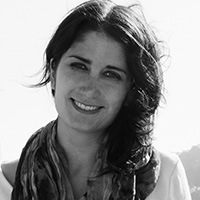Slush
by Jacqueline Berkman
I don’t normally meet up with strangers to rehash the last time I saw their missing ex-wives. But it was a foggy Monday morning, I was newly unemployed, and didn’t quite know how to operate within the parameters of my free time.
I was still unfamiliar with the neighborhood and picked the first café on Fulton Street that I could find. It was only a couple of blocks from my apartment and I had just sat down when Frank walked in, nodding at me as he headed toward my table.
“Casey,” he said, extending his hand. “Thanks so much for meeting me. I’m sure you have a lot going on.” He looked just like the pictures that I googled, handsome in a professorial type of way, tall and wiry with a salt and pepper beard and dark, inquisitive eyes.
“No problem,” I said, stirring my coffee. I kept my head down so I wouldn’t laugh, because the reality was I had nothing going on. I had just moved from Philadelphia for my dream job in San Francisco only to find out, four days in, that the company was shutting down.
So I kicked off the new workweek like any self-starter in Silicon Valley would and slept in past 10 am, ignoring repeated texts from my boyfriend back east, only stirring awake when a call came in from a number I didn’t recognize. In the hopes it was a job recruiter, I picked up, but it was a man’s voice I had never heard before, and he had barely introduced himself as Frank McAllister before cutting to the chase. “I know this might sound crazy,” he said, “but did you go hiking in Lake Tahoe this past weekend with a woman named Nancy Foster? Blonde, petite, around 5’4?”
My stomach lurched. I propped my pillows up against the wall and surveyed my barren apartment as I figured out what to say. I didn’t recognize the name, but the physical description matched the woman I had spent the previous Saturday with, and before I could formulate a response he said, “She’s my ex-wife. She broke into my house and stole my wife’s diamond bracelet, probably a few hours before she met you.”
“My God,” I said, a gasp escaping me, as if I were some stunned bystander in a Lifetime drama.
“Look, I know we don’t know each other, that you have no real incentive to help, but can you do so anyways, out of an act of kindness?” Frank’s voice was a bit breathless, as if he just ran up a flight of stairs. “I have no idea where she went, but she sent me a cryptic email this morning that didn’t mention anything useful except for your name.”
“Really?” I said, not proud of the fact that my voice shot up several octaves, undoubtedly inflated by a sense of importance I didn’t know I had.
“Yes. She admitted to stealing the bracelet. She wrote: ‘I can’t tell you where I am, or when I’ll give it back. All I’ll say is that I went on a hike in Lake Tahoe last weekend and met a young woman named Casey Valeri from San Francisco, and I feel she has changed me for the better. How, I’m not sure, but that’s what I’m on a mission to find out. I’ll be in touch soon.’ ” Frank cleared his throat, the notion that he had Facebook stalked all the Casey Valeri’s in San Francisco who potentially fit the bill already implicit. “You can imagine my frustration, and my wife is distraught. So please, could you find it in your heart to help a stranger in a pinch?”
Help a stranger in a pinch. It was a saying prior to those last few days that I would have dismissed as corny, as my day-to-day life was built upon a foundation of self-interest, just like everyone else. But since Saturday, this sentiment seemed to be the recurring theme in my world. I recalled my hiking partner with a bewildered fondness, and before I knew what I was doing I agreed to meet Frank at a coffee shop, out of a desire to propel the kindness to strangers movement if nothing else. “One thing,” I said. “Bring a picture when you get there, I need to confirm it’s the same person, I think she gave me a fake name.” I hung up, practically shaking with excitement.
Fast forward an hour, and the noir-like atmosphere only continued as Frank sat down at my booth and slid a Polaroid photo across the table. We were quiet as a waitress refilled our coffee, and it was only after she left that I flipped it over and studied the image, which was of Frank and Nancy on a boat, presumably during happier times. “Yes, that’s her. “
Frank sighed. “Whew,” he said. “At least we’ve got that.” He smiled with a small, closed mouth and I thought it was tasteful, the right mix of friendly and concerned. “Look,” he said. “I know this whole thing must be strange for you. It’s strange for me too. And I don’t know what your impression was of Nancy when you met her, I know that she can be quite charming, but the truth is that she’s crazy.” Frank’s hands began to tremble, and I felt a bit sorry for him. “She’s a kleptomaniac,” he continued. “She was off kilter when we were together, maxing out credit cards, lying about it, and after we divorced she got even worse. She called our mutual friend twice to bail her out of jail for shoplifting. And just when I think the dust will settle, that she’s out of my life for good, she goes and does something like this again.”
“I’m sorry to hear that,” I said, though I wondered if part of him enjoyed telling this sordid tale, making it just so he was the center of it. “I’ll try to be as helpful as I can.”
“Whatever you remember will be helpful, I’m sure,” Frank said, vigorously stirring Splenda into his coffee. “When did you first come across her on Saturday?”
I sighed. “Let me think,” I said. “About four hours into my hike.”
And that was true. The first four hours were spent walking along a muddy trail, lost in my thoughts, barely appreciating the pine trees, the mountains and the snow. I was fuming over my job situation. How the severance package was shit, how it was so unfair to be laid off after only four days, how things like this happened in the world all the time but in the grander scheme of human suffering it wasn’t even considered a blip.
“I stopped at a clearing in the middle of the afternoon because I was running low on water, and that’s when I met her,” I said. I remembered it well, being caught off guard by the unseasonably powerful sun on my back, the snow all around me melting into slush. I had scoured my canvas bag to see if I miraculously remembered to pack another canteen with water, but of course I had not.
“My God,” Nancy said, just a few minutes later, huffing and puffing as she approached the same clearing. She was a pretty, well-manicured woman who looked to be in her mid-50’s, using a broken off branch for a walking stick, which seemed oddly primitive in contrast to her North Face Jacket, Lulu Lemon yoga pants, and Ecco hiking boots. “I’m so out of shape. To think I’ve done this for so many years and now I can barely breathe. The joys of getting old.” She sighed and shook her blonde hair from the confines of her beanie, and I noticed that it was clearly dyed, dark roots beginning to sprout from underneath. “What’s your excuse?” she said, nodding in my direction. Her eyes regarded me with sympathy, as if I represented the lost traveler she once was.
“I’m low on water,” I said, feeling like a fool as the words came out, so at odds with the prepared me, the one who was always designated driver, who brought more than enough trail mix and apple slices for everyone on road trips.
The upper corners of her lips curled up, bemused, into a smile. “Well, we’re quite the duo, aren’t we?” she said. She reached into her knapsack, also North Face, and handed over an impossibly large canteen filled with cool water. “Looks like we should stick together.”
“Nancy was really friendly, and I was clearly in a pinch myself,” I said, though Frank winced at my use of the expression. I looked down, avoiding his judgmental gaze. “I needed help, “ I said, my voice shaky. “And I wanted company, and she was there for me, so we started hiking together, and that was pretty much that.” I drummed my nails against my mug, the coffee burning in my throat. “But she did give me a fake name.”
Our introductions took place as we approached a change in terrain, where the muddiness of the trail gave way to a dramatic incline filled with rocks and slush. Nervous, I extended my hand.
“I’m Casey,” I said, and I remember she hesitated before taking it, looking at me with a veil of suspicion. “Casey Smith?” she said, a grin on her face.
“No, Casey Valeri,” I said, suddenly embarrassed by withholding information, even though I never usually introduced myself to people using my first and last name.
“We’re approaching the hardest part of the trail.” she said. “I would know, I’ve done this several times before. So I want to know who it is I’m dealing with.” She laughed, as if to add levity to the mood, but there was a focus in her eyes that made me think this information was, for some reason, important.
“What’s your name?” I said, clutching onto my backpack like a student, eagerly awaiting instructions on how to proceed next.
“Bonnie Parker,” she said, climbing up the first rock. “Nice to meet you.”
Hearing this, Frank shook his head in disbelief. “Jesus,” he said, “You realize who Bonnie Parker is, right?”
I didn’t, and my silence gave me away.
“Bonnie Parker. The woman who inspired Bonnie and Clyde, the film about the bank robbers? Nancy is unbelievable.” Frank smacked the table, clearly angry, and I bit my lip so it wouldn’t look like I was smiling. I had to admit it was clever, and fitting in a sort of way, two people leaving the boundaries of civilization and the confines of its laws.
“Sorry,” he said. “I cut you off. What were you saying?”
I shrugged. “Not much,” I said. “Bonnie—er, Nancy and I were figuring out our strategy for getting up the mountain.”
The trail was steep and downright intimidating. All around us, upwards and downwards, right and left, there was nothing but rocks and the rapid disintegration of snow under a glaring spring sun. But Nancy didn’t seem daunted. “One important thing to know about this part of the trail is that most of the rocks are unstable. It’s more like bouldering than hiking. We’ve got to rely on our endurance,” she said, panting as she climbed, before turning around to evaluate me, an experienced adventurer sizing up a timid novice. “Have you ever done anything like this before?”
The short answer was no. I liked to hike, and I would frequently try to get Tim to join me on hikes back in Philly, but he was always preoccupied, whining about one law school exam or another that he had to study for. And without him, I never mustered the courage to jump in my car and explore a new trail by myself. “Not quite,” I said.
“It’s intense,” Nancy said, propping her walking stick for me to grab onto as I hoisted myself onto one of the rocks. “But intense physical exercise is good. It gets you outside of yourself.”
“Exactly,” I said, in what I hoped was a cheerful voice. I focused on my breath as I climbed behind her, my calves screaming as one foot ascended after another, and whatever it was that held my guard up began to erode, much like the snow all around us. It was then, I told Frank, after we had barely begun climbing those damn rocks, that I—kind of—broke down.
“Broke down?” Frank said.
“Yeah,” I said, looking out the window. The trees swayed back and forth in the fog, the 5 Fulton bus made its routine stops, and life moved along, farther and farther away from this sequence of memories. ”I felt like I was going to faint. I crouched down on a rock and told Nancy I didn’t think I could go on any more.”
Frank’s eyes glazed over, his fingers rapidly tapping against the table, as if waiting for me to get to something good. I diverted my gaze, my face flushed with shame as I recalled the moment I burst into tears. I had been overwhelmed and dehydrated, and it was as if the mountain had triggered some kind of desperate rawness in me, the kind where you want to spill your guts to anyone, and the normal privacy filter you carry around inside melts away and you begin to tell stories in the way that you actually see them.
Seeing my distress, Nancy used her stick to hoist herself down to the rock beside me. “Casey, dear,” she said, putting her arm around me.
“I need to turn around,” I said, tears hardening on my face, the beginnings of a headache blooming in my temples. “I barely have any water, I’m completely out of my element.” I was practically hyperventilating at this point I was so upset, gasping for breath in between sobs, snot dripping out of my nose and only the back of my hand to wipe it off.
“There was a lot on my mind, and Nancy wanted to listen,” I said to Frank, even though I could tell he clearly was unimpressed, figured me for some kind of emotional loose cannon. And with an overwhelming urge to defend myself, I said: “I hadn’t eaten since breakfast, and the altitude was getting to me, just making everything worse.” I hoped that made my crisis clearer than it was, wrapped it in a bow tidy enough for Frank to walk past without a second thought. Which it seemed to, because he expressed no interest in the subsequent conversation that occurred right after.
“I have no idea what I’m doing with my life,” I told Nancy. “I moved from Philadelphia last weekend to accept my ideal job in San Francisco, and my boyfriend back home won’t stop calling me, and it hasn’t even been my first week out here and they are already shutting the company down and laying everyone off.” I wanted to calm down, but the more I said the more agitated I got. “So now I’ve got to start all over again.”
“Yes,” Nancy said. “You’ve got to start all over again.” There was a pause between us, an extended moment of silence, doves whistling as they sailed across the sky and nestled into trees, the crystalline blue lake perfectly still below us. “Do you have any idea how lucky you are?”
The comment caught me off guard, as if I was clubbed on the head by a blunt instrument. Dazed, I looked out at the lake.
“You think I’m lucky?” I said.
“Yes!” She said. “You are so lucky. You’re young and free and you can reinvent yourself in any way you see fit. It’s the most beautiful thing in the world.” She looked over at me. “First things first, though. Leave that dumb boyfriend behind. For good.”
“He’s not dumb,” I said, almost too quickly. Which was true. Tim was smart, book smart at least, one of the most book smart people I knew. But maybe that was the problem. All he knew was what he read on the page, and it narrowed his world, turning him into a self- righteous automaton that only studied and complained.
“He’s no good for you,” Nancy said. “You can’t be afraid to walk away from things.”
“You’re right, I guess,” I said, even though I was afraid of walking away from things, terribly so. And there was something gnawing at me, some persistent fear that couldn’t seem to abate.
“What’s the matter?” Nancy said.
“Don’t you ever feel like, even if you walk away from things, that your problems will just find you anyway, just smack you in the face wherever you go?”
“That can happen,” Nancy said, a bit more somberly than I would have liked. “But what’s the alternative?”
I shrugged. “There isn’t one, I guess.” I looked at Nancy, who was still Bonnie to me then, and found myself admiring her slim body and stylish clothes, her impractical walking stick perched in the snow. “How did you get so wise?”
“If you don’t dwell on the past, it can’t weigh you down,” Nancy said. She sighed, a long painstaking breath, and I imagined her lungs fluttering like butterfly wings. “Don’t get me wrong, though,” she said. “There are a few things I’d like to fix.”
“Like what?” I said, but she waved me off.
“Oh, it’s exhausting getting into it. Mostly, I miss my son Marcus. I haven’t seen him in a couple years. I think he lives in Phoenix now. I want to explain some things to him, but I’m not sure he wants to see me.”
“How come?” I said.
“Let’s just say I haven’t been the world’s best parent,” she said, and then her eyes glazed over for a moment, as if she were deeply considering something. “His birthday was last week. He just turned 25.”
“I’m 25 too,” I said, and it was only a moment later when I saw Bonnie’s bottom lip quiver and her eyes fill with tears. “Are you okay?”
“I’ll be fine,” she said. She shivered, even under the sun, and after wiping away tears reached into her pocket and pulled out a 50-dollar bill. “This is yours,” she said. “The bottom zipper of your knapsack has been open this whole time.” She took a gulp of water and smiled. “Be more careful.”
* * *
“Anyway,” I told Frank, “She gave me a good pep talk and we turned around and headed downhill and that was pretty much that.” I avoided eye contact because I could tell he was growing increasingly frustrated, as I were telling him the world’s most boring story. And maybe I was. But, perhaps in sensing his disinterest in the details, I had selectively omitted more and more, deciding he wouldn’t understand, didn’t deserve to understand, any of it.
“You know,” I said, slapping the table with sudden gusto. “I just thought of something that might help you out. Nancy kept saying that the hike was amateur stuff, that she wanted to climb Mt. Whitney. She was going to head there after Tallac and send me a postcard. Maybe she’s in one of the lodges around there, if she hasn’t started hiking it already.”
Frank nodded, punching buttons in his iPhone, and it didn’t take a genius to know he was investigating lodging near Mt. Whitney. Which amused me, because for all of his time married to a schemer he’d remained as gullible as ever. I doubted he’d be clever enough to out what she actually did, which was book a Virgin America flight to Phoenix.
I stretched my legs, looking around me at the mostly empty café. The fog and drizzle gave way to a sunny afternoon, and I was overcome by all of the things I had to do.
“Well, Frank,” I said. “I’ve got to get going. I hope I was helpful.”
“Yes,” Frank said. “I hope so, too. Thank you, Casey.” He extended his hand and by the time I shook it, his attention was directed towards the next item on his to do list, the person on the other end of the line. “Hello, my name is Frank McAllister, I was wondering if you recently had a guest named Nancy Foster? No? How about Bonnie Parker?”
I waved as I walked out, the cool air reviving my lungs. I had five missed calls from Tim, and when he called again as I was walking home I finally found it within me to pick up.
“Where have you been? Do you even care about this relationship?” he said, his voice blubbery with angst. Beethoven, or some equally appropriate study music, was playing in the background.
And I took a deep breath. “Listen,” I said, my body flooding with adrenaline, “I moved to San Francisco for a reason, and even if it’s not clear what the reason is anymore, I’ll just have to wing it it until I figure it out. And your endless calls and texts are not helping me figure it out. So please, for the love of God, would you give me some space.” And then, surprising even myself, I hung up.
There really was so much to do. Unpacking, emailing recruiters, assembling Ikea furniture, doing whatever people did to get on their feet. But for the first time in a while, I felt light, and as I walked up the steps to my apartment I envisioned Nancy in Phoenix, walking across the gravelly driveway to Marcus’ place. I pictured a young guy making his way downstairs, opening the front door, looking out inquisitively. His mom. I hoped he’d invite her in. That he’d offer her something to drink and listen to what she had to say and accept that whoever she was, whatever she’d done, that she was enough.
BIO
 Jacqueline Berkman is a writer based in San Francisco. Her short fiction has been published in The Writing Disorder, Waccamaw, and The East Bay Review, among other places. Her short story “Picking Locks,” which was adapted into the short film “Panofsky’s Complaint,” was screened at the Brooklyn Short Film Festival in June 2016.
Jacqueline Berkman is a writer based in San Francisco. Her short fiction has been published in The Writing Disorder, Waccamaw, and The East Bay Review, among other places. Her short story “Picking Locks,” which was adapted into the short film “Panofsky’s Complaint,” was screened at the Brooklyn Short Film Festival in June 2016.



 he cameraman counted down from 5, the lights went up, but it was only after the host crooned “You’re watching Dr. Morgan” and the Caribbean music was cued that Jordan Bickwell’s lower back really began to sweat.
he cameraman counted down from 5, the lights went up, but it was only after the host crooned “You’re watching Dr. Morgan” and the Caribbean music was cued that Jordan Bickwell’s lower back really began to sweat. Jacqueline Berkman is a writer living in Los Angeles with a background in publishing and public relations. Her short fiction has also appeared in The East Bay Review.
Jacqueline Berkman is a writer living in Los Angeles with a background in publishing and public relations. Her short fiction has also appeared in The East Bay Review. 











